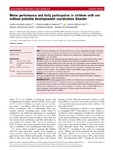Mostrar o rexistro simple do ítem
Motor performance and daily participation in children with and without probable developmental coordination disorder
| dc.contributor.author | Delgado-Lobete, Laura | |
| dc.contributor.author | Montes-Montes, Rebeca | |
| dc.contributor.author | Pértega-Díaz, Sonia | |
| dc.contributor.author | Santos-del-Riego, Sergio | |
| dc.contributor.author | Hartman, Esther | |
| dc.contributor.author | Schoemaker, Marina M. | |
| dc.date.accessioned | 2021-09-07T11:29:48Z | |
| dc.date.available | 2021-09-07T11:29:48Z | |
| dc.date.issued | 2021-09-06 | |
| dc.identifier.citation | Delgado-Lobete L, Montes-Montes R, Pértega-Díaz S, Santos-del-Riego S, Hartman E, Schoemaker MM. Motor performance and daily participation in children with and without probable developmental coordination disorder. Develop Med Child Neurol. 2022;64(2):220-227 | es_ES |
| dc.identifier.issn | 1469-8749 | |
| dc.identifier.uri | http://hdl.handle.net/2183/28432 | |
| dc.description.abstract | [Abstract] Aim. To test the mediating role of motor performance in the relationship between individual and environmental constraints, delayed learning of activities of daily living (ADL), and daily participation in typically developing children and children with probable developmental coordination disorder (DCD). Method. Parents of 370 randomly selected children aged 5 to 10 years (194 females; mean age [SD] 7y 5mo [1y 10mo]) were included in the study (321 typically developing, 49 probable DCD). Motor performance, ADL learning, and participation were assessed using the DCDDaily-Questionnaire. Individual variables included child’s age and sex, and environmental variables included mother and family educational level, presence of siblings, and area of residence. Direct, indirect, and mediating effects were tested using a partial least squares-based structural equation modelling approach. Results. The model explained 44.5% of the variance of daily participation. Motor performance significantly mediated the effect of individual and environmental constraints, and ADL learning on daily participation. Interpretation. Results suggest that the effect of individual and environmental constraints and delayed learning of ADL on daily participation is mediated by motor performance in typically developing children and children with probable DCD. These findings provide further evidence that interventions to promote participation in children with probable DCD should adopt ecological, task-oriented approaches. Further studies should evaluate model generalizability with clinical samples. | es_ES |
| dc.description.sponsorship | Xunta de Galicia; ED481A-2018/150 | es_ES |
| dc.description.sponsorship | This research was partially funded by the European Social Fund 2014–2020 and Galician Government, grant number ED481A-2018/150. Funding for Open Access charge: Universidade da Coruña/CISUG. | |
| dc.description.sponsorship | Xunta de Galicia; ED481A-2018/150 | |
| dc.language.iso | eng | es_ES |
| dc.publisher | Wiley | es_ES |
| dc.relation.uri | https://doi.org/10.1111/dmcn.15036 | es_ES |
| dc.rights | Creative Commons Atributtion-NonCommercial 4.0 International License (CC-BY-NC 4.0) | es_ES |
| dc.rights.uri | http://creativecommons.org/licenses/by-nc/4.0/ | * |
| dc.title | Motor performance and daily participation in children with and without probable developmental coordination disorder | es_ES |
| dc.type | info:eu-repo/semantics/article | es_ES |
| dc.rights.access | info:eu-repo/semantics/openAccess | es_ES |
| UDC.journalTitle | Developmental Medicine & Child Neurology | es_ES |
| UDC.volume | 64 | es_ES |
| UDC.issue | 2 | es_ES |
| dc.identifier.doi | 10.1111/dmcn.15036 |






